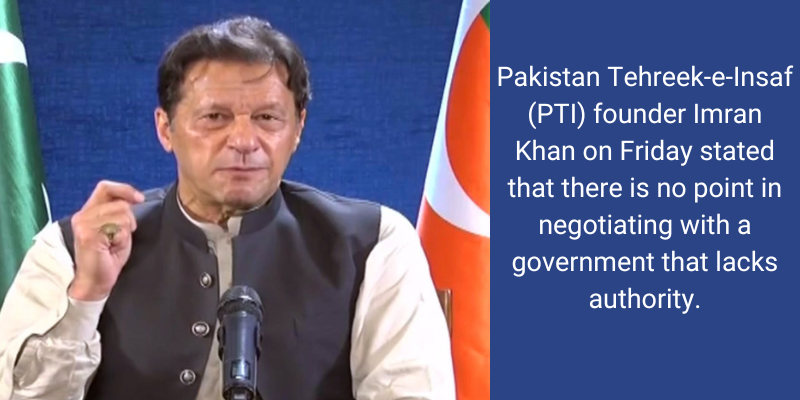Article:
In the complex political landscape of Pakistan, Imran Khan, earlier Prime Minister and leader of the Pakistan Tehreek-e-Insaf (PTI), has repeatedly voiced his frustration with the current government's worth. His recent statements highlight a critical sentiment: there is no point in conveying with a government that he perceives as powerless. This article delves into the nuances of Khan's position, the broader political context, and the implications for Pakistan's future.
Imran Khan's Critique of Government Powerlessness
Imran Khan has been vocal about what he perceives as the feebleness of the incumbent government. According to Khan, the current administration lacks the authority and capability to make noteworthy decisions or bring about meaningful change. This criticism stems from various factors, including economic challenges, governance issues, and external influences that impede effective policymaking.
Khan argues that the government is merely a facade, controlled by powerful entities behind the scenes. He believes that true power lies away, making negotiations with the government futile. This stance reflects his broader cynicism with the political system and his call for a more transparent and accountable governance structure.
Economic Turmoil and Governance Challenges
One of the core arguments laid forth by Imran Khan is the ongoing economic turmoil in Pakistan. The country has been grappling with high inflation, rising debt, and a struggling economy, which Khan attributes to poor governance and bungling by the current administration. He contends that the government's inability to implement effective economic policies has exacerbated the financial crisis, leaving ordinary citizens to bear the brunt.
In addition to economic issues, Khan points to a series of governance challenges. Corruption, lack of transparency, and inefficiency within the government gadget are major concerns. Khan's PTI has consistently called for reforms to address these issues, but he argues that without genuine power, the government cannot enact the necessary changes to improve the situation.
External Influences and Political Dynamics
Khan's assertion of the government's powerlessness is also tied to outward influences that he believes undermine Pakistan's sovereignty. He has frequently mentioned the role of international financial institutions, foreign governments, and multinational corporations in dictating policies that do not align with Pakistan's national goods. According to Khan, these external pressures limit the government's ability to act independently, further justifying his stance against negotiating with a powerless administration.
The political dynamics within Pakistan also play a crucial role in Khan's perspective. The interplay between various political parties, military influence, and judiciary actions creates a complex environment where power is fragmented. Khan argues that until there is a clear and unified center of power, any negotiations or political dialogues are unlikely to yield substantial results.
Imran Khan's Vision for Pakistan
In light of his criticisms, Imran Khan has outlined his vision for a New Pakistan—a nation that is self-reliant, economically stable, and free from corruption. His vision includes:
Economic Reforms: Khan advocates for robust economic reforms to stabilize the economy. This includes measures to reduce debt, control inflation, and promote sustainable growth through investments in key sectors such as agriculture, technology, and infrastructure.
Good Governance: Central to Khan's vision is the establishment of transparent and efficient governance. He calls for stringent anti-corruption measures, improved public services, and accountability at all levels of government.
Sovereignty and Independence: Khan emphasizes the importance of maintaining Pakistan's sovereignty. He advocates for policies that prioritize national interests and reduce dependence on external entities.
Social Justice: Ensuring social justice and equitable distribution of resources is a key component of Khan's vision. He aims to uplift marginalized communities and provide opportunities for all citizens to thrive.
Implications for Pakistan's Future
Imran Khan's stance on the powerlessness of the current government and his broader vision for Pakistan have significant implications for the country's future. If his critiques resonate with a substantial portion of the population, it could lead to increased political pressure on the government to address the issues raised. Additionally, Khan's call for reforms and transparency may influence policy debates and shape the political discourse in the coming years.
However, achieving his vision will require overcoming numerous challenges. The entrenched political and economic interests that Khan criticizes are daunting obstacles. Furthermore, building consensus for his proposed reforms will necessitate effective leadership and strategic alliances.
Assumption
Imran Khan's assertion that there is no point in negotiating with a powerless government encapsulates his broader critique of Pakistan's political and economic landscape. His call for meaningful reforms, transparent governance, and national sovereignty reflects a vision for a stronger and more self-reliant Pakistan. As the country navigates its complex challenges, Khan's perspectives will continue to play a pivotal role in shaping the future of Pakistan.






